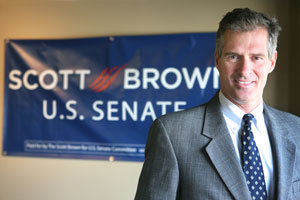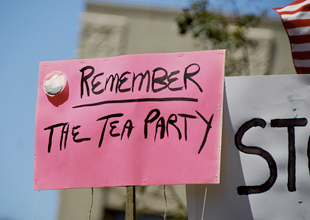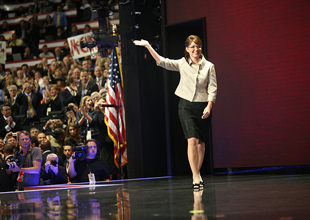
By Flickr user <a href="http://www.flickr.com/photos/perspicacious/3208630766/" target="_blank">LizMarie</a> under a Creative Commons license
In last night’s Illinois gubernatorial primary, an overwhelming majority of Republican voters cast their ballots for someone other than Adam Andrzejewski, a Tea Party-backed insurgent who had won an endorsement from, of all people, Polish Nobel laureate Lech Walesa. As political blogger Dave Weigel points out, this really shouldn’t be considered too much of a death blow to the movement given that Rep. Mark Kirk, the GOP candidate in the other major statewide race, has courted the Tea Party vote himself. But it does underscore an often overlooked point: There’s an important distinction between the candidates who benefit from anti-incumbent Tea Party fervor and those who actually embody the “movement.”
For a couple of examples, look no further than Massachusetts, where Scott Brown’s special election victory was hailed as a triumph for the Tea Party. While Brown did capitalize on people’s frustrations with Washington, the whole Tea Party bit, as our own Kevin Drum explains, was overblown. To the extent that the Tea Party represents any coherent philosphy, Brown doesn’t fit the label. He supports the concept of universal health care (he even voted for it once), in fundamental conflict with the movement’s anti-government underpinnings. He’s also pro-choice and supportive of civil unions. Normally that would earn him a primary challenge, not endorsements from the likes of Ralph Reed and Sarah Palin.
Brown isn’t the only odd duck. Joining him in the Bay State’s rejuvenated GOP is Charlie Baker, a former health care executive (and blogger) who is running against Gov. Deval Patrick. Baker, who kicked off his campaign at Tea Party shrine Faneuil Hall on Sunday, is pro-choice and supports gay marriage (he even picked an openly gay state senator, Richard Tisei, as his running mate). Like Brown, Baker supports (in principle) the Massachusetts health care plan that has served as a partial model for President Obama’s proposals—Baker has called for “escalating financial penalties,” for those who don’t sign up. (Somebody get Betsy McCaughey, stat!)
The Tea Party meme has caught on so forcefully because both sides get something out of it: Democrats like being able to depict all Republicans as radical fringers, while Republicans get to lump together any opposition to the president and sell it as part of some populist shift to the right. The truth, as Massachusetts and Illinois demonstrate, is bit messier. Just as the amorphous antiwar, anti-Bush tides of ’06 and ’08 gave us liberal icons like Heath Shuler and Parker Griffith, no GOP wave will be complete without a new class of moderates to go along with Marco Rubio and Rand Paul.
Follow Tim Murphy on Twitter.


















